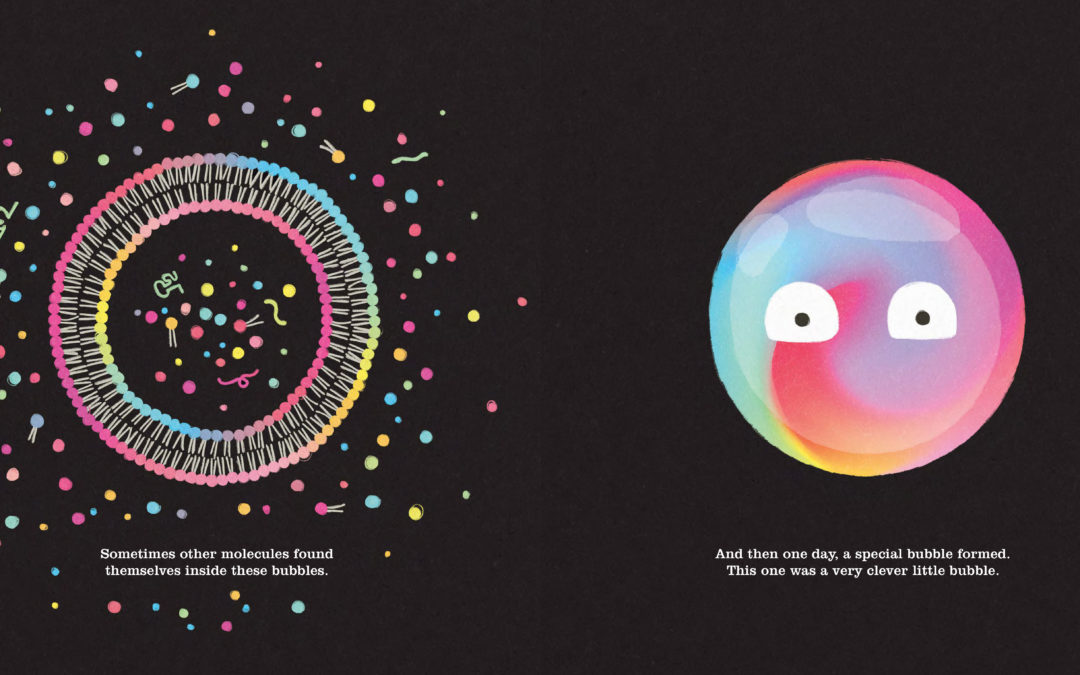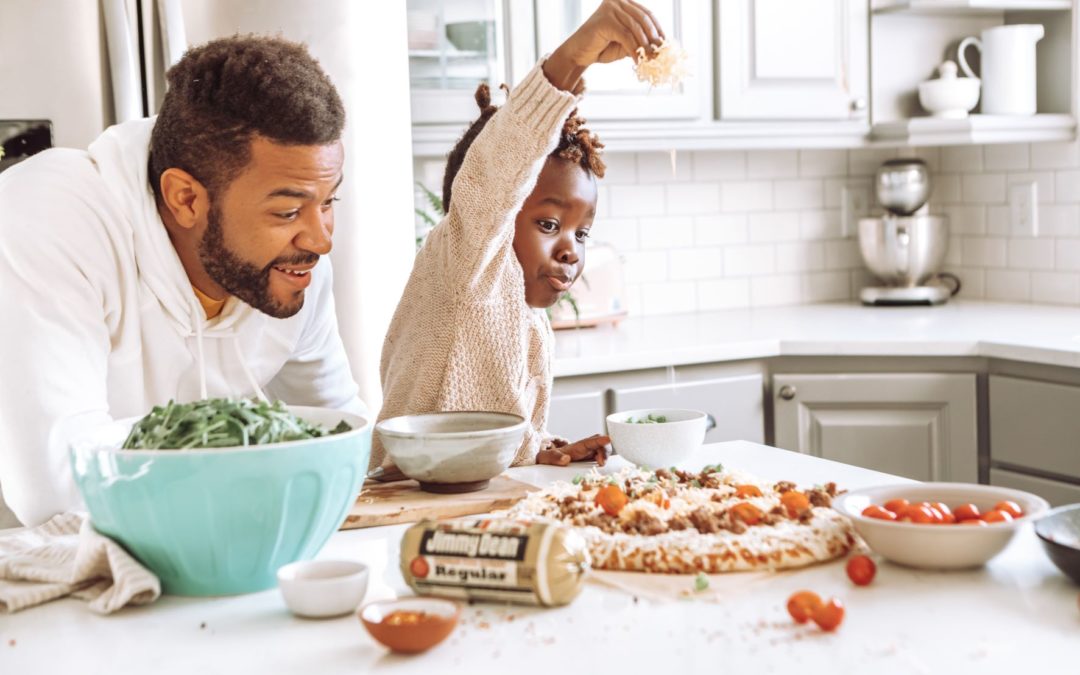DAD.info talks to American actress, comedian and mental-health campaigner, Ruby Wax O.B.E., about depression, mindfulness and her upcoming U.K. Frazzled tour…
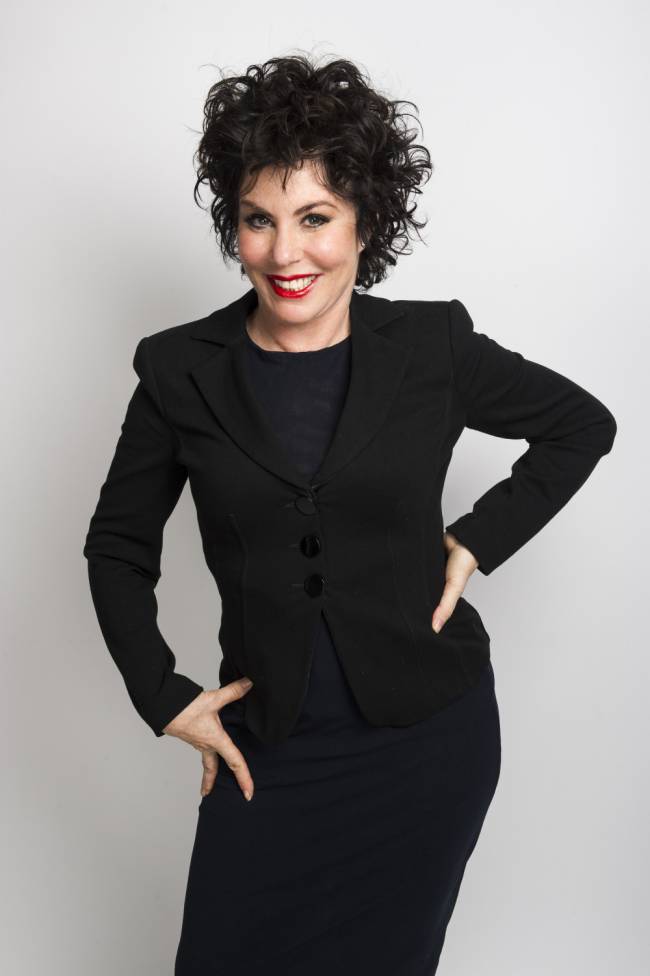
It’s 3.55pm on a Monday afternoon and I’m sprinting around a full-to-bursting ExCel London exhibition centre like a banshee, looking for an unlocked, empty room with a power socket. I’m carrying three totes bulging with brochures I’ll never read and a stuffed gorilla (don’t ask), balancing a half-drunk latte that’s threatening to end up down my jeans and holding an almost-out-of-juice mobile to my ear with my shoulder, as I finish off a three-way conference call.
My day so far has been thus: wake up at 7.30am and fuzzily recall the reason for my thumping head (industry party ’til 1.30am the night before); get up and immediately trip over drunkenly kicked-off shoes; shower and dress in 60 seconds; leave room looking like T. K. Maxx at height of January sales; feel guilty about not going for a run, so climb stairs twice super-fast to compensate; think about making an energy-packed green smoothie, decide there’s no time and shovel down a bowl of sugar-coated Frosties; have a mild panic attack, decide there’s no time and focus on breathing as I run to the station; get into town at 9am for a meeting; blah, blah, blah; run to the DLR; file copy, make notes and check emails en route to ExCel; run to a press conference; traverse five-mile-long exhibition hall four times in 30 minutes for meetings; run to the press room and request a quiet place for a 4pm phone interview with an incredibly famous US star; resist the urge to scream on being told there isn’t one; sprint around ExCel London like a banshee…
I’ll be honest: I never thought I would need Ruby Wax in my life. She’s always been around of course: starring alongside Dawn French, Jennifer Saunders and Tracey Ullman as the mouthy, brash American actress, Shelley DuPont, in ’80s ITV sitcom, Girls on Top; popping up in guest appearances on Absolutely Fabulous, which she script edited throughout its run; and irreverently rifling through the Pierre Cardins and corsets of divas and the deranged in the ’90s BAFTA-nominated BBC series, Ruby Wax Meets, where she sardonically schmoozed shoe-obsessed former first lady of the Philippines, Imelda Marcos, and managed to monumentally miff off Madonna by wearing the megastar’s pants on her head.
Brave, brazen and bold, Ruby’s frequently had me laughing until I cried and wishing I was one of those confident, smart, and sassy women that can hold their own and own a room: sharp, funny, popular and with enough chutzpah to crash, burn and still come up smelling of roses.
But in recent years, Ruby’s been delivering much more than laughs. On 17 February 2016, the American-born Ms Wax was presented with an OBE – a Queen’s honour, making her an Officer of the Most Excellent Order of the British Empire – for her services to mental health. And at the comedienne’s request, she was presented it at The Priory Hospital in Roehampton, the high-profile behavioural and rehabilitation clinic where she’s received treatment herself for several breakdowns. In true Ruby style, the solemn ceremony, lead by Wing Commander Mike Dudgeon, the upstanding Vice Lord Lieutenant of Greater London, was followed by a salsa class delivered by an ex-Chippendale called Derek, complete with baby-oiled six-pack, tattoos and a bandana.
“It was the most out-of-body-experience of my life,” Ruby, 64, confessed after the ceremony. “Outside of delivering another human being while on heavy drugs of course.”
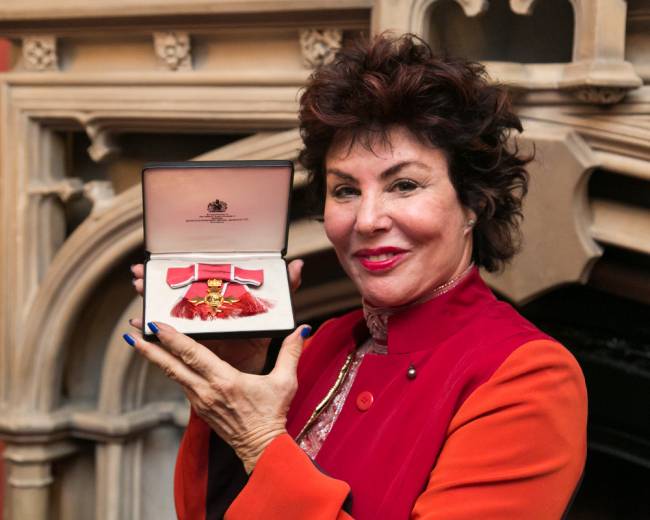
It wasn’t the first time she’d raised the roof at the hospital. In 2010, inspired by her experiences and already emerging as a poster-girl for mental health through her work with Comic Relief, Ruby wrote Live from the Priory with fellow sufferer and musical partner in crime, Judith Owen, performing the show in the grounds to an audience of patients and friends including Sir Ian McKellen. Throwing the doors wide open on a topic that was still largely taboo, the pair went on to tour private and NHS mental health treatment centres across the country, before bringing the show’s unique brand of ‘theatre therapy’ to the west end under the new guise, Losing It.
A patron for the British Neuroscience Association and ambassador for the charities Mind and Sane, it’s Ruby’s own on-going struggle with mental illness that led her to study for a Masters Degree in Mindfulness-Based Cognitive Therapy (MBCT) with Mark Williams, a professor in the Department of Psychiatry at Oxford University in 2013.
Born in Illinois to Austrian-Jewish parents who fled the Nazis for America in 1939, Ruby has hinted in the past that their overbearing eccentricities may have affected her growing up, but she’s reluctant now to apportion blame. “It’s impossible to say that my depression is linked to my parents’ behaviour when I was a kid – you have to take genes and experience into consideration, too.”
Ruby moved to the U.K. in the late seventies to follow her dream of becoming an actress and, after training at the Royal Scottish Academy of Music and Drama, started her acting career at The Crucible Theatre in Sheffield before going on to perform in several productions with the Royal Shakespeare Company. TV and film appearances followed, but it was through comedy writing, acting and interviewing that she became a household name.
Still, despite a happy marriage (she’s been with TV producer and director Ed Bye since 1988), loving family (the couple have three children, Max, Maddie and Marina), dream house, professional success, fame, wealth and endless accolades, Ruby has frequently found herself under the dark cloud of clinical depression since first being diagnosed while pregnant with Marina in 1993, trying several forms of therapy to help get her through.
“I chose to study MBCT because I had been taken to the cleaners by every psychological intervention known to man (and woman). I’m ashamed to say I even did a session of rebirthing, where they stuck me in a bathtub with a snorkel and, afterwards, pulled me out by my heels (it was just as bad as the first time around).”
In MBCT, Ruby finally seems to have found a technique to calm the storm: research has shown it has a 60% chance of preventing relapse in patients who have experienced three or more episodes of severe depression.
“What really hooked me was the fact that you can practice mindfulness on your own: no running to shrinks shouting ‘Fix me!’ at all hours… and the best news is: it’s free (being a Jew, for me that’s half the cure).”
The course, and in particular her scientific studies about the complex working of the brain and how to re-train it, marked another change in direction for Ruby, who channeled her writing and comedic skills into a critically acclaimed book and theatre show, Sane New World: Taming the Mind, which heralded mindfulness as a way to master the mayhem. Pulling off the tricky feat of being easily accessible, scientifically smart, deeply moving and laugh-out-loud funny, the project helped to further smash the stigma of mental health.
In January 2016, Ruby released the next instalment in her ongoing investigation into the workings of the brain, A Mindfulness Guide for the Frazzled. Hitting number one on the Sunday Times Bestseller List, the guide once more combines hilarity, heart-break and science and offers practical advice in the form of a six-week mindfulness course for beginners, plus tailored exercises for parents, children, relationships and the workplace. The aim is to equip the ‘frazzled’ with the tools they need to emotionally connect with themselves, their world and with others.
Following sell-out shows around the country, a month-long run at Leicester Square Theatre in London, and a residency at Underbelly Edinburgh Fringe in August, Ruby is returning to the stage this autumn performing a further 22 dates of her one-woman show, Frazzled, in the UK and Ireland, starting in Exeter on October 16th.
And it’s for this reason, as I dial her mobile number from that room in the ExCel Centre at 4.01pm on a Monday afternoon, that I come to understand why I need Ruby Wax in my life…
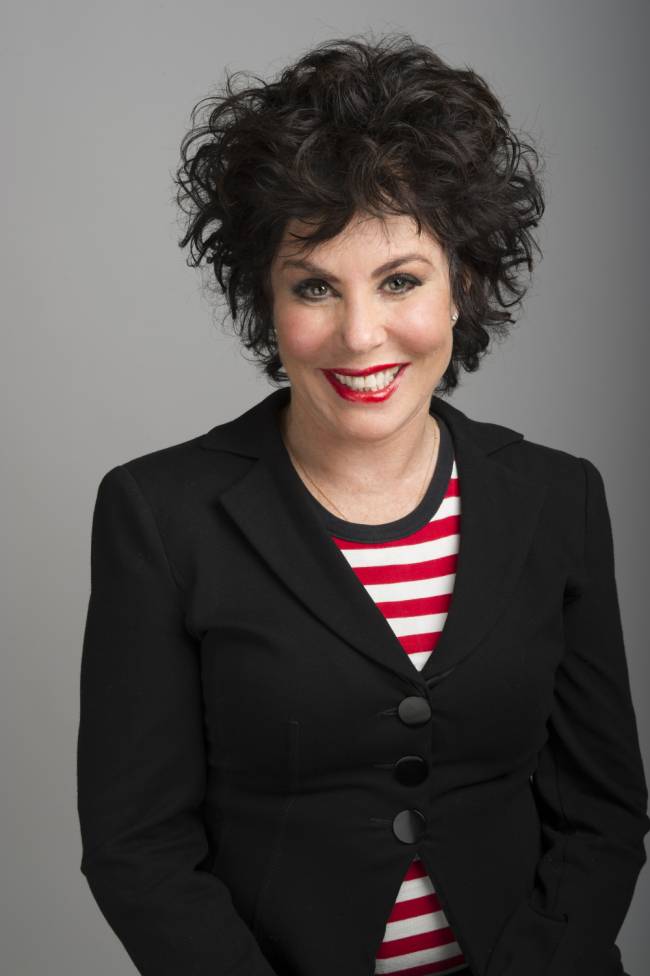
Hi Ruby. Is now a good time to talk..?
Hi, hi. Yes. Sure. But I have the flu and I’m going away tomorrow, so would it be OK if we talk fast? (This makes me smile. How appropriate to discuss a book about the frenetic pace of life on mobile phones at break-neck speed, poetically illustrating the point that none of us has enough time now. Ever.)
Of course. Let’s talk about your book, A Mindfulness Guide for the Frazzled. Why do you think people need it and what compelled you to write it?
I think lots of people are struggling to cope with life, but the problem isn’t always something tangible that people can put their fingers on, and everyone thinks they’re alone in how they’re feeling. The book aims to explain what’s happening to us and what we can do about it. Hopefully people will find it funny, but it could also actually save your life. Mark Williams, the professor who I studied MBCT with at Oxford, gave me permission to take his mindfulness training and put it into my own words. He really started the whole thing and he’s brilliant, the real deal.
You studied the complex workings of the brain as part of your course – how does that link to mindfulness training?
I learned that the mind is malleable and it’s completely possible to change the way you think. Your genes, hormones and early learning do not determine your fate. You can reinvent yourself. A neurobiologist might say that someone in a state of ‘frazzle’ is at risk from the constant stress overloading their nervous system, flooding it with cortisol and adrenaline; their attention is fixed on what’s worrying them and not the present, which leads to stress and burn-out, which can cause major health problems, too. Practising mindfulness – noticing what’s going on in your mind – can turn that around. We’re happier when we’re calmer. We need to learn to cool the system.
Why do you think we’re all so ‘frazzled’?
Humans have sent rockets into space but for some reason we’ve neglected to really explore ourselves. We keep trying to achieve and get more, with absolutely no insight as to why. Many of us are on autopilot, ticking boxes of things to do each day, but we need to shake ourselves out of this stupor.
It’s not always easy to practice mindfulness while trying to balance a busy life though. Why is it so tricky for us to master?
Because mindfulness isn’t a natural state for humans – historically we’re meant to be vigilant and think negatively or we’ll be caught off guard, like a gazelle on the plains that could get eaten by a lion. But in the past we had an off switch, like the gazelle. If it escapes the lion it goes back to happily grazing, but today, humans have no rest period. We’re kept in a perpetual state of anxiety. First there’s a hurricane, then there’s a train crash, then there’s Trump – we get over one fear and the next one is waiting in the wings. We’ve become fearful about fear. Pain is pain, but suffering is optional – we shouldn’t constantly be ruminating or getting exasperated but we can’t stop: it’s constant.
So how do we work mindfulness into our everyday lives?
It’s important to remember that you don’t have to live in a continual state of mindfulness; it would take 10 years to leave your house, let alone put on your socks. The techniques in the book are just exercises, and you practise them for a limited period of time, depending on how much time you have. Even when you’re doing it wrong, it’s always right because you’re not trying to make anything better or to empty your mind of thoughts, it’s just about noticing what’s going on in your mind.
Do you think technology is helping to keep people in a state of ‘frazzledom’?
Partly, yes. Rather than us driving the machines, they’re now driving us. If you offer humans a challenge, they’ll try and keep up with it – it’s our default mode. It’s what makes us brilliant, but offer us too much and we’ll blow a fuse. We need to deal with technology as it’s not going to go away, nor should it, but like me, everyone needs to know when to pull on the brakes. Who isn’t obsessed with their iPhone? These days that’s how you determine if you are loved, or if you are successful, or if you have any meaning on Earth. How many phone calls you get is how your self-esteem is valued. You can spend the rest of your life online but it will never make you feel the same way as when someone covered in skin smiles at you. Our brains are still like a caveman’s – technology has advanced faster than we have and we have to learn how to pay attention and slow down the machine. As a society we need to figure this stuff out.
How do we stop being so busy when it seems there’s always more and more that we need to do just to keep up?
Excessive busyness is usually a sign that all is not well. When I’m reaching burn-out, I start fixing too many dates and writing too many emails. I become so busy that things no longer make sense. You need to find that balance between creativity and a downward spiral. There’s not going to be some test at the end of our lives, so why are we cramming so much? I know I’m at my limit. I’ve had to send my memory to the cloud now, and I don’t know how to get it back down again. Like I say in the book, “Don’t just do something, sit there!”
I’m pretty frazzled right now. What can mindfulness do for me?
Being mindful really helps to get you out of that churning red mist. You can learn to focus for longer on the positives and not get carried away by that incessant negative internal commentary: “I’m not good enough, I’m a failure, nothing I do is right, blah, blah…” For me, one of the hardest parts of practising mindfulness is getting to grips with self-compassion – no one is as cruel to me as me – but that’s really the bedrock of mindfulness. It’s also about strengthening your ability to focus on the present, which isn’t something we do naturally as we’re too preoccupied. Attention, presence, focus – the more you practice, the easier it gets to call on these things. It’s not for everyone of course. If you’re adjustable and you can self-regulate easily, you may not need it.
Some would be surprised to hear of your inner battles with self-esteem, as outwardly you always seem so confident and self-assured…
No – I’m really not at all! Like any skill, it’s practice. You practice to fake it to make it. I always do my breathing exercises before I go into any situation which could be stressful, like performing or giving a talk. I’ve trained myself, using the techniques in the book and I always ask myself, “What’s the worse that can happen?” Luckily, you’re usually not going to be executed!
There’s a passage in the book where you say you’ve always felt like an outsider. Do you still feel like that?
It doesn’t matter how much success you’ve achieved, how much you’ve been praised, or how many friends you have, people with a certain attitude will still feel like an outsider: it’s like a hole that you can never fill. It’s only when I really get to the heart of things – the honest, human bit – that I finally stop feeling so alone. Since touring with Sane New World and Frazzled, I feel like I’ve finally found my tribe.
You’re partnering with Marks & Spencer to provide pop-up Frazzled Cafes across the country to get that human connection. What can visitors expect?
The cafes provide space for those who feel they are cracking from the pressure cooker of life to take some time out and communicate face-to-face with their own kind. Most of us don’t have a Quaker meeting house on the corner any more, but we still need to feel we’re part of a community. Like AA, it’s the chance to talk about what’s happening in your life. Guests complete a questionnaire before their visit and there are facilitators for each group of 15 people. There’s the chance for people to talk in the second half of my live shows, too – the cafes are just more intimate.
Mindfulness is now taught in some schools and the book also covers techniques for children and teenagers. Can it work for them too?
I’ve tried to include mindfulness techniques for everyone, as training yourself to focus – attention training – can benefit all ages. My daughter went to drama school and they taught mindfulness there. My son does it too. One in three kids are now struggling with some kind of issue as they’re under more exam pressure now than ever before. Some are also dealing with parents who are pushing their kids to achieve in areas where they believe themselves to have failed. We really need to back off and just let them be kids.
Do you have a mantra when it comes to mindfulness?
The whole book is really a mantra and what it’s saying is that you can change your brain but, like your body, you need to train it. I suppose mindfulness to me is noticing your thoughts and feelings… but without kicking your own ass while you’re doing it.
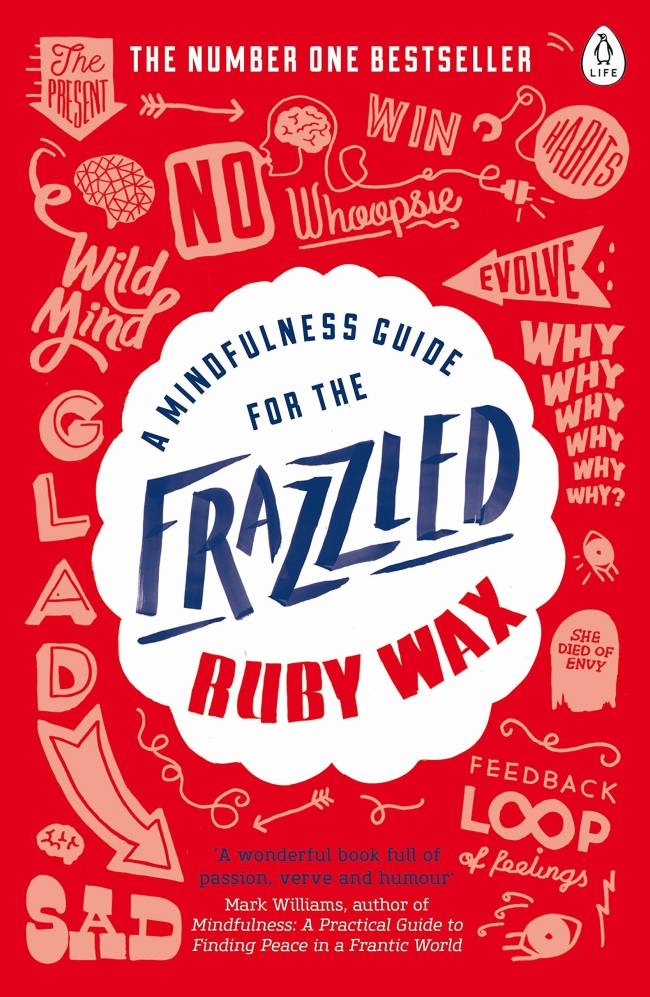
A Mindfulness Guide for the Frazzled by Ruby Wax is out now in paperback.
Her next book, How To Be Human: A Manual, will be published in January 2018.
The Frazzled Tour starts in Exeter on October 16th and travels the U.K. and Ireland until December 3rd.
Find out more and book tickets at rubywax.net



